|
 More than such a talented
composer, a great friend. We missed a long, nice talk with Brian
Tyler, one of the best and hard working composers right now
in the business. Furthermore he seems to take the lead from one of the
greatest and most famous composers ever in film music history: Jerry
Goldsmith. More than such a talented
composer, a great friend. We missed a long, nice talk with Brian
Tyler, one of the best and hard working composers right now
in the business. Furthermore he seems to take the lead from one of the
greatest and most famous composers ever in film music history: Jerry
Goldsmith.
It happened a warm evening in Madrid last
september, we decided to phone Brian to his music
studio where he was expecting us, once more, with his arms well opened,
to travel with him across the last three years of his career, his
scores, his films, all his new works not treated before in previous
interviews with us. You can read all of them here, at BSOSpirit.com.
Enjoy!
BSOSpirit:
Hello Brian, how are
you?. This is BSOSpirit.com from Spain
Brian Tyler: Oh,
very well, thank you, haha, good to meet you again, how are you doing?
BS: Very
well, thanks. It has been a long time since our last interview. How is
it going there?
BT: Working away of
course. Very much going on, haha, working in a lot of movies at once,
but it's Ok.
BS:
Yeah, you have been working a lot from our last conversation, a new
bunch of pictures. Do you have time enough now for the interview?
BT: Oh, yeah, of
course, no problem. Let's start.
BS:
Oookay then, let's begin. If you don't mind, firstly we are going to
ask you about your latest works.
BT: Okay!.
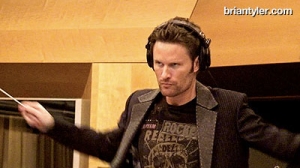 BS:
Let's start with your work for Aliens Vs. Predator:
Requiem . We guess you have almost completed the score
at this time, and we would like to know how it is going to be your
approach, is it more Goldsmith rather Silvestri
, or would you say it's 100% Tyler
? And what can you tell us about new
thematic material for the saga? BS:
Let's start with your work for Aliens Vs. Predator:
Requiem . We guess you have almost completed the score
at this time, and we would like to know how it is going to be your
approach, is it more Goldsmith rather Silvestri
, or would you say it's 100% Tyler
? And what can you tell us about new
thematic material for the saga?
BT: Oh, I haven't
completed the whole score yet, but the sound of the music is
referencing the classic Silvestri 's
scores, but as well the Alien saga, Goldsmith,
Horner, Goldenthal,
and Frizzell works. Well, what I wanted
to do is paying homage to the sound created. For Predators
, Alan got a
sound, a very melodic one, but with a lot of brass and percussion, a
lot of rhythm creating melody, what we know now as Predator music. I
wanted to compose in that style.
The Alien music is much more aggressive, avant
garde in a way, kind of strange and I wanted to bring both styles
together and reference the past combining it with new themes for the
new film.
In the new score, I can tell everything is new,
with those references to the past, but what I enjoy the most is
creating this combination between the classic sounds of the creatures,
their particular voices, and the new material, but I must say there is
so much score in the film (about 95 minutes the complete score).
Yesterday I finished the recording of one particular complex cue, and
it was a 22 minutes long one, and that only for one cue.
BS:
Wow!
BT: Yes, and it was a
cue very difficult to play, very complicated and challenging for the
orchestra, for the musicians. We were very excited about conducting it
for four weeks. It has been recorded in Los Angeles
with the Hollywood Studio Symphony , and
they have done a really great job, and now we are going to record at Newman
Stage at Twentieth Century Fox's .
It's going to be lots and lots of brass and percussion, something
fantastic to hear.
BS:
Brian , do you know if your
score for this film is going to be released? By Varese
Sarabande , or some other company?
BT: Oh, yes. I spoke
with them, yes, but now it all depends of the conversations with Fox,
but I'm sure there's going to be a release of the score (after
a few weeks from this interview we know that Varese
Sarabande will release the score – 21
tracks, 79 min long and with a Special Alien
Vs Predator Suite Requiem arranged by Brian
Tyler ).
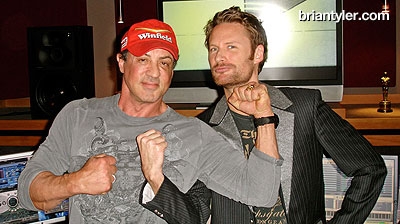 BS: Ok, let's change the
topic. What can you tell us about the creative process for Rambo
IV (a.k.a. John Rambo) ,
which will bring to an end the story of this character at the big
screen? Have you already composed something for this film? Could you
premiere us something about the score? BS: Ok, let's change the
topic. What can you tell us about the creative process for Rambo
IV (a.k.a. John Rambo) ,
which will bring to an end the story of this character at the big
screen? Have you already composed something for this film? Could you
premiere us something about the score?
BT: I have already
started the film, I've written music, but we are in the early stages of
writing. The movie is going to definitively use the Rambo
themes. Jerry Goldsmith composed
those really great motifs for the character, and what I will do is
paying homage to those themes inside a new score and a whole new
scenario, but with Jerry 's music in
mind. What I have composed at this moment is kind of inspired by Jerry
. The story of my involvement with the film
comes from the close relationship of work between Sylvester
Stallone and Jerry .
They worked very close together for the films, Sylvester
listened my music and thought I would be
appropriate for the score, that I was close to his feelings about the
music.
The score will have a strong orchestral and
percussive component as well, the movie takes place in Burma
, so there is a kind of eastern, we can call
“Burmese” kind
of jungle feel for the percussion, very naturalistic. Yes, it's going
to be very ethnic and acoustic, with those trumpet themes as well.
BS:
And Brian , what about the action
pieces?, are we going to listen those remarkable obstinatos and
electronic passages, Jerry 's trademark?
BT: Well, you know, I
think this is closer to the feel and mood of First Blood
, sort of, than Rambo II ,
for instance. The movie is very gritty and dark, like First
Blood, and my approach will be more live, more
orchestral than synthesised. Very acoustic, much more like the first
film, and with less electronic elements in it.
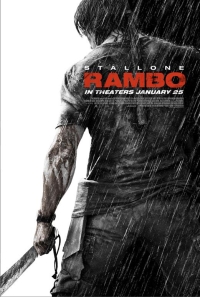 BS: We are
looking forward to listen to this score, Brian .
But, do you feel somehow pressure by the fact you may be compared with Master
Jerry Goldsmith ?. BS: We are
looking forward to listen to this score, Brian .
But, do you feel somehow pressure by the fact you may be compared with Master
Jerry Goldsmith ?.
BT: Hahaha, oh, it
has happened before. I mean, for me, it is an honor, but Jerry
Goldsmith and myself have often been linked together,
for example in Timeline . That was
definitely a direct comparison because we both score the same exact
film, hahaha, and I worked in Star Trek ,
now in Aliens and in Rambo
. A lot of movies or projects that I
composed in which he had worked or he was the previous composer or was
involved in them. It is something I kind of grown accustomed to, and I
am comfortable with it, but, you know, Jerry
is Jerry, well, I think I definitely dive
into it, haha.
BS:
Brian , we think that you are
the best choice to follow the footsteps of whom we have always regarded
as the best composer in film history: Jerry Goldsmith.
BT: Oh, thank you,
thank you. It is quite an honor.
BS:
Brian , you have an amazing
talent, and your scores always excel the film they have been composed
for. Do you feel that there is a risk to write this kind of music for
pictures with a shorter budget than the one you'd need? Directors may
be more demanding thinking that you've worked in many blockbusters (the
only one being Constantine).
BT: Yes, I think so,
there is definitely a risk to open yourself up to comparison, but part
of me it's not just a film composer but a film score fan and lover of
his films, and if Jerry had some great
music for a previous movie and he is no longer here, I want what's best
for the film and I really take it so seriously what he did. I want to
be the one to jump in there and continue that, try to think what would Jerry
be doing and that's the perspective I try
to take with such a project like Rambo.
BS:
Do you know that Rambo IV may put you
in the spotlight and help you work on larger films or not?
BT: Ah, yeah. With
any film that you compose there is the chance to get a new audience or
new directors that liked your music, so it is very hard to tell which
ones are going to further my expectations, so I work hard in every
single project, I treat every one of them as the most important project
I've ever done. I approach every film like that.
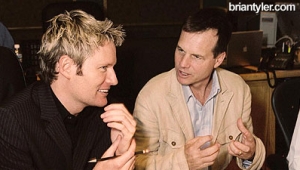 BS:
Okay, well Brian , we would like to go
back in time a little bit now, to the last score we talked about in our
last interview, The Greatest Game Ever Played .
This could be your all time best work. With two years in the making,
which are your memories from your collaboration with Bill
Paxton ? BS:
Okay, well Brian , we would like to go
back in time a little bit now, to the last score we talked about in our
last interview, The Greatest Game Ever Played .
This could be your all time best work. With two years in the making,
which are your memories from your collaboration with Bill
Paxton ?
BT: Oh, it is very
interesting because I worked with Bill
in a film called Frailty before (the
very first film he directed) and it was so different movie than The
Greatest Game... it requires so different music, that he
had no idea if I could have in me the style of music he needed for the
new film, because he really knew me from the previous film as a very
dark, very brooding film composer, haha. The new film needed such a
different approach. What I really enjoyed working with Bill
on the film was to be able to score it more
in a manner of scores done many years ago. I mean, playing him themes
on the piano, more about melody, not the usual way of presenting fancy
mock-ups and so to the executives. That's fine, I do it, it's the way
it is, but I think there are limits sometimes. You end up writing music
to make it sound good for the samples instead of really writing music
directly to the live orchestra, losing time and energy.
I approached it from the perspective of a very
heartfelt music, very true to the period and reflective to the idea of America
being a nation of immigrants, of people of
all over the world (that's the reason of the Irish ,
or Scottish feels to the music that come
together into the score).
It is kind of an un-American
feel, I had never written anything like that before, it was very
gratifying.
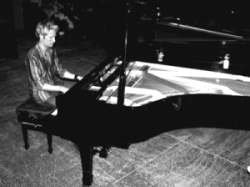 BS:
Very fresh, yeah. Well Brian , we have
to thank you for having mentioned some members of the web page within
the booklet of The Greatest Game Ever Played . BS:
Very fresh, yeah. Well Brian , we have
to thank you for having mentioned some members of the web page within
the booklet of The Greatest Game Ever Played .
BT: YEES, yes, I'm
glad you noticed that.
BS:
Thank you very much Brian.
It was a great honour and a dream come true for us, Thank you so much.
BT: No problem, you
know, when I came to Spain for the
Conference I played the main theme of the film on the piano, and
finally I ended up playing, strangely enough, when I went back, that
piano version in the final cut of the film and, adding to the score
that cue that I have played in Spain. In
the CD it is the piece "An Unlikely Outcome" ,
that piece is at the end of the film. Well, the original ending of the
movie didn't have that version, it was all orchestra, and after that
moment on the piano in Úbeda,
I decided to perform that piece with piano only. We may say that
actually the Conference affected the score in a way, and it was really
fun to find that way, and I felt you were somehow connected to the
process to be in the booklet.
BS:
Thank you very much Brian.
BT: Sure.
BS:
Let's talk about Annapolis.
We think it is a combination between Rocky
and An Officer and a Gentleman.
BT: Yeah,
absolutely, haha.
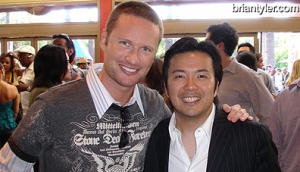 BS:
Haha, a very entertaining movie in which you worked with Justin
Lin for the first time. Did you know him beforehand? BS:
Haha, a very entertaining movie in which you worked with Justin
Lin for the first time. Did you know him beforehand?
BT: I didn't. I met
Justin when I was finally mixing The
Greatest Game Ever Played , just finishing the film and
I got a phone call (the Studio was very frantic because another
composer was doing Annapolis and he
just went out of the project), Justin
wanted a new composer right away, and I went over to the editing room
with Justin . He showed me the film and
I immediately told them my impressions about what I thought the film
needed musically and he decided "Okay, You are the guy" .
It was really based on one meeting, and, as you probably know, at this
time Justin and me have collaborated in
three films: Annapolis, The
Fast and The Furious: Tokyo Drift, and now Finishing
the Game, and he is now one of my very best friends.
It's very strange how things happen sometimes, haha, we actually went
to college together at the same exact time and we graduated the same
year but I never met him.
So, there were a lot of connections there of which
I have no idea, but I really feel very fortunate of having jump on to Annapolis,
having met Justin finally and clicked
with him to make a score like this. A score which I feel very thematic,
where you can play a theme on different instruments and make it sound
right. Because it's very difficult, playing for example a theme on the
guitar and then blowing it out into a big orchestral march. To work in
both ways was a challenge.
BS:
Brian, talking about these points, how actively you can
be the performer of some instruments in your own scores? Was the reason
a budget constraint or you really wanted to play all these instruments
by yourself as fun?
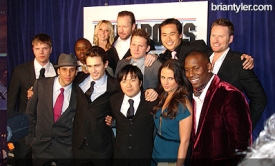 BT: Yeah,
it was fun, haha. I don't even think about it when I am writing a
score, I'm not thinking in how many instruments I am going to play
myself but in a case of a living orchestra I finally play a lot of the
leading instruments. I always play the piano, the drums or the
percussion, the guitars as much as I can, and in the particular case of
Annapolis, I played the guitar
because it is easier for me to play it instead of teaching the
performer about how to play it. I am very particular with some
instruments like guitars, dulcimers, bazoukis, drums, piano, acoustic
guitars, mandolins, all those instruments I find very personal in terms
of the style of how you played. That's the reason I want to do it
myself. BT: Yeah,
it was fun, haha. I don't even think about it when I am writing a
score, I'm not thinking in how many instruments I am going to play
myself but in a case of a living orchestra I finally play a lot of the
leading instruments. I always play the piano, the drums or the
percussion, the guitars as much as I can, and in the particular case of
Annapolis, I played the guitar
because it is easier for me to play it instead of teaching the
performer about how to play it. I am very particular with some
instruments like guitars, dulcimers, bazoukis, drums, piano, acoustic
guitars, mandolins, all those instruments I find very personal in terms
of the style of how you played. That's the reason I want to do it
myself.
BS:
When we listen to the opening tracks of
your soundtracks albums we are always amazed by how powerful they seem
to be.
BT: Thank you.
BS:
This is also the case in Annapolis.
The order of the tracks is certainly not chronological. Did you take
this decision about the arrangements and the order, or was it decided
between you and Robert Townson, for
example ?
BT: It varies,
sometimes the director and the producers get involved and they decide.
Then I don't have the power of decision necessarily, but usually what I
propose it is a first track to present the thematic ideas, a kind of
suite or introduction of the main theme, then I try to go
chronologically starting with the next track. But it doesn't always
work out that well just because of different factors and I think that
presenting the pieces in a different order is a better listening
experience in those cases. It depends on each particular case and the
different circumstances for each score.
Other case it is when I have composed much more
music that it fits on the CD, and I have to choose which cues must go,
and which ones have to be left outside. It could be sometimes painful
and the most difficult part of it really.
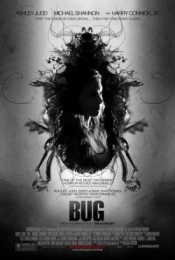 BS: One of
your last films sees you pairing again with renowned director William
Friedkin. Had your previous collaboration be so
interesting as to repeat once again?. Was it him who called you?. BS: One of
your last films sees you pairing again with renowned director William
Friedkin. Had your previous collaboration be so
interesting as to repeat once again?. Was it him who called you?.
BT: Yes, for The
Hunted I was not even in consideration for that film,
haha. At that time my name was not put in consideration for a film that
big (I just have scored Frailty), but
because of time constraints, I believe Howard Shore
was originally going to do The Hunted,
and I don't know what happened with Howard, but
what I do know is that William Friedkin went to a
movie theatre the weekend that Frailty opened
here in the USA , he saw the movie and
he loved it, specially the music. That Monday morning, first thing he
found my number, called me and asked me to come and to meet him. I was
so surprise and so honored, I say yes, of course, and then he asked to
do the score in that first meeting.
BS:
After the work for Bug
(your other collaboration with Mr. Friedkin),
you get the tag or the label of “experimental
composer”. How do you feel about it?
BT: Oh, yeah, haha.
It's always interesting, I've seen many descriptions, haha. I suppose
some of the music that I've scored it's experimental. If you look at Bug,
or The Hunted it's a little more
experimental, it has that feel, one of my new scores, The
Heaven Project, can be considered experimental, but in
the other hand, if you consider scores like The Greatest
Game Ever Played, or Children of Dune or
Partition, they are much more
melodic and actually kind of traditional in many ways, so, I don't
know, I just try to write whatever music is going to fit the film more
appropriately and help the film the most, and if some of my music is
experimental and avant garde it is because the film needs that kind of
feel.
 When
you try to be innovative and you are trying to do things a little
outside the border, those scores (like The Hunted
or Bug) have always been my most
controversial. There are people who typically love them or absolutely
hate them, those are the ones where I get feedback from people than
think this is my absolutely best work, it's polarised. When
you try to be innovative and you are trying to do things a little
outside the border, those scores (like The Hunted
or Bug) have always been my most
controversial. There are people who typically love them or absolutely
hate them, those are the ones where I get feedback from people than
think this is my absolutely best work, it's polarised.
BS:
We like this work, we like Bug.
BT: Thank You. That
is the most controversial I think, people argue about that one a lot,
haha, never the same opinions, haha.
BS:
Brian, is Bug something
like your own Planet of the Apes, in
terms of how much you seem to experiment with instruments and sounds?
BT: Exactly, hahaha,
there's no doubt. It's one of these things I had complete freedom on
the score, and I want to push the boundaries of what I knew could be
considered music in a sense. It was really trying to go to a different
place that I normally do.
 BS:
Okay, let's jump to another of your collaborations with Justin
Lin: “The Fast and The Furious: Tokyo Drift”. This
is seen again as an evolution in your own style. Let's say you've
created a sub-style of your own, which I think, it has later shown in War.
Is that right? BS:
Okay, let's jump to another of your collaborations with Justin
Lin: “The Fast and The Furious: Tokyo Drift”. This
is seen again as an evolution in your own style. Let's say you've
created a sub-style of your own, which I think, it has later shown in War.
Is that right?
BT: Yes, in a fact
kind of talking about, there are different styles of music that I have
done. There are probably four, five, six kinds/types of scores I do. The
Fast and the Furious is one of them, with that
aggressive action music, a live orchestra playing hard but with a lot
of modern elements and drums and a heavy percussion as well, but
certainly there is an evolution from that score to War,
but also there is a connection between those two. Both are modern
action films, one a racing car film with a lot of action, the other an
action/thriller movie, and both have an Asian component to the
storyline. In the kind of style of the score, they are family in a way.
BS:
Did you listen to some of the previous
scores, BT and David
Arnold had composed?
BT: Oh yes. I have
seen the films and you know, I don't know BT personally
except we do joke between each other because people confuse us because
of our initials, but I know David very
well.
 BS: We believe David
is a good friend of yours, is that right? BS: We believe David
is a good friend of yours, is that right?
BT: Yes, David
is my friend, he is a good friend of mine
and I really respect David and what he
does. The reason of the differences between TFATF
scores and Tokyo Drift wasn't because I
didn't like the music of the other two, it was more because, as opposed
to the other two movies, Justin wanted
to score the film most predominantly with music instead of songs, and
the other two movies had mostly songs and less score.
Tokyo Drift was
mostly score and some songs. I think it's the only one to get a Score
album release, and for the first time we could create character
thematic themes for the saga with that score (I had about sixty five
minutes of music to compose for the film) I don't think BT
or David
were really given the opportunity with the fifteen minutes or so of
score they were allowed and they could get into the movies in spend of
a melodic score. It was a treat for me to get a melodic feel for the
score apart of the modern action.
BS:
Was your own love for cars and speed
something that influenced the movie, or not?
BT: Oh, yeah, for
sure. I'll tell you something, at the beginning of the film I knew more
about drift racing and cars than the director himself, but he became
such a student of that that now he really knows what he is talking
about, for sure, you can't argue with him about cars, haha. I love
cars, I love all types of racing, I'm a big Formula One fan (that's my
main theme in terms of what I watch), but in my own life I do race
(also in a different car, haha) and you know, it was fun being able to
write music to my hobby (the other love of my life, which is car
racing). To be able to kind of merge two things that I REALLY LOVE into
one.
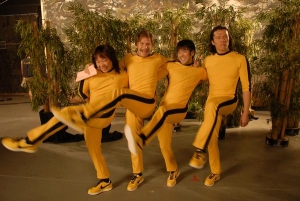 BS:
That's great. Okey, you keep on composing for Justin Lin
in Finishing the Game,
which is a mockumentary (a false documentary) on Bruce
Lee. This takes advantage of the sounds of the seventies
following the many footsteps of the many recordings of that time. Could
you describe us a little bit how this experience was? BS:
That's great. Okey, you keep on composing for Justin Lin
in Finishing the Game,
which is a mockumentary (a false documentary) on Bruce
Lee. This takes advantage of the sounds of the seventies
following the many footsteps of the many recordings of that time. Could
you describe us a little bit how this experience was?
BT: This could be
the most surprising soundtrack I ever made. This December 2007
is the premiere of the film, at this moment not
many people have listened to the score yet and I think they will be
shocked by what they'll find. The whole score is like... well I wrote
all of it like if it was all songs, but I wrote them all in the old 1970's
kind of funk, and that kind of thing and I recorded everything with
only equipment older than 1976, so all the
instruments, all the microphones, the recording gear, everything have
to be of that era, very authentic to that period. I also played a lot
of instruments, the drums, the base guitars, the keyboards... there is
also a brass section, haha, anyway, I can explain but, you really have
to hear it to know what I am talking about, haha. It's completely,
completely different than anything I've ever done. It will be fun to
see people's reactions.
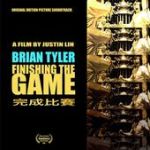 BS: Is
there going to be an album, Brian ? BS: Is
there going to be an album, Brian ?
BT: Oh yes, there
will be for sure. I know they are working to get a CD, but I do know
it's available at ITunes for
world-wide. You will be able to find it and get it there at this moment
at least for download.
BS:
Okey, let's move on to Partition
which I think is close to Children
of Dune in terms of color. Did you make a conscious
choice?
BT: Sure, like The
Fast and The Furious: Tokyo Drift and War
are connected, Partition
and Children of Dune are connected.
That's more because of the films than anything, both have a similar
feel, both take place in a middle-eastern type of environment and they
are both epic in terms of scale, and both romances in the set of a war,
or a time of war, with the obvious difference that Partition
is a true story.
The feel of Children of Dune
was more middle eastern, Partition is
more Indian, but at the same time, the director (who is Indian, Vic
Sarin ), he hired me on the fact that he loved the COD
soundtrack, so, what he wanted was to give my western sensibility of
themes (bold romantic themes) to the film, knowing at the same time
that I was able to infuse all of the Indian and
Pakistani percussion into it, to
incorporate local instruments of the area (that I was familiar too)...
and to get the combination of the orchestra (with a very epic type of
themes that I wrote) with the percussion and the ethnic flavour
(incorporating those local instruments to the mix).
BS:
Great. Well, we are finishing the
interview. Let's talk about War. One
might say you've focused on high-octane action-driven films. Again do
you happen to have chosen so?
BT: I think, well,
it's sometimes strange how things work, I don't really think about it
too much actually, about which films I'm going to score. It's much more
of a collusion of different events which brings me to every film.
Talking about War, the director, Philip
G. Atwell, had just seen The Fast and the
Furious in the theatre (just the same case like William
Friedkin before) and called me in to come see the film
the following Monday.
You know, the way that just one action film can
link to another and connect all of these films together is because
basically directors that I had never work with before find me on the
basis of preparing some other film. He did not ask for me to do a score
like The Fast and The Furious , it was
just that the films were similar in their tones, so, you know, I love
doing action films, it is definitely something I always want to do, but
I like changing it up. I like doing dark films too, more like horror
movies or science fiction like the case of Aliens Vs.
Predator: Requiem now, and you know, things like Rambo
, or my next project coming up, which is The
Heaven Project, much more an introspective drama. So as
long as I can keep on shifting styles and genres, you know, I'll be
happy.
 BS: War and
TFATF:TD have similar styles
but in the first case your achievements in terms of how you create an
atmosphere are even more remarkable. BS: War and
TFATF:TD have similar styles
but in the first case your achievements in terms of how you create an
atmosphere are even more remarkable.
BT: Oh, thank you.
BS:
You're welcome. Please tell us, how did you
come to the idea of hiring the London Symphony Orchestra
?
BT: For War,
the original idea was the electronic component of the score, it was
going to be partly hip hop, partly techno driven, and I thought in
order to balance out that feel, that style of the supporting tracks,
that we should get kind of the most classical styled orchestra in the
world, which is really the London Symphony Orchestra .
They have a natural, pure, classical, very
symphonic style and it's a little bit different from the sound or the
styling you can get in the orchestras of the United
States , maybe a little bit of a jazz tone to it. I
wanted to contrast both musical worlds with this score, we can say. I
just love the London Symphony
regardless, I think they are great, and it's a privilege to conduct
them. They are fantastic, and I'll work with them any time but for this
in particular I kind of need a contrast stylistically with the
supporting electronic elements of the score. A score which reflects
both worlds, symphonic at its best and electronic.
BS:
Did you decide to have one CD
release , and at the same time, an ITunes
release with the Complete
Score ?
BT: Yes, I knew that
the commercial release would have songs as well, and not a whole
presentation of the score. Because in one particular CD there is not
enough room for both the Complete Score
and the songs, and because I received a lot of e-mails asking for the
possibility of a Complete Score
available, I decided, since ITunes is
out there, why don't we put it out there for people that wanted it. At
least people can get it in some manner.
The only difference between the soundtrack
commercial album that has the songs in it as well, and the ITunes
release is the Remix of the
Main Title on the CD, that the ITunes
one hasn't got. I'm not sure why that is, but that's how it is. Anyway,
when I can I will try to get the Complete Scores
out there for those who want them.
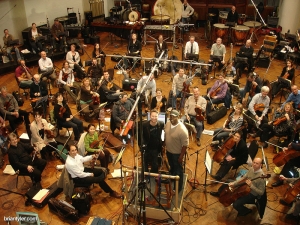 BS:
Us, us, haha. We want. BS:
Us, us, haha. We want.
BT: Hahahaha, Yes.
You Know, for me, I love having Complete Scores
and having all that's possible on the CD, but sometimes I have been
criticised for having too much on the CD which it is strange to me, but
you know, regardless, the better thing to do I think, it is to get it
out them for the people who really “do” want
them.
BS:
Yes, of course, we completely agree with
that. Thank you Brian for taking care
of the music score fans all over the world. And to end this interview,
what about Bangkok Dangerous ? Will this
one be released?
BT: Oh, yes, it
will be release on February. To see it in a while, haha. But I can tell
you I'm very excited about this soundtrack, I think you may really like
it, it is definitely one of my strongest scores for sure.
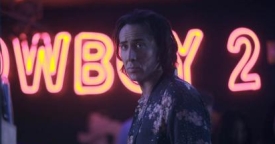 BS: Okey,
we wait for it, no doubt of that. Brian, our last
question, would you talk us about your next projects coming up? BS: Okey,
we wait for it, no doubt of that. Brian, our last
question, would you talk us about your next projects coming up?
BT: Yees. Right now
I am just focus on Aliens Vs. Predator: Requiem ,
John Rambo and The
Heaven Project . This one is going to be an ensemble
type of score, very introspective, very heartfelt, it is a movie about Purgatory
and it's going to be different than anything I've
done before, and I am really happy and very excited doing it. It also
comes up next year, like Bangkok Dangerous .
But for now, I am going to be releasing Finishing
the Game , Aliens Vs. Predator: Requiem ,
Bangkok Dangerous and John
Rambo , I'll be working in The Heaven
Project , and there are some other films coming up, but
for those films I will not be scoring until we were deep into 2008.
 BS: Great,
very good, okey Brian , many thanks for
your time. BS: Great,
very good, okey Brian , many thanks for
your time.
BT: No problem, it has been a pleasure guys.
BS: We hope we can see
you back in Úbeda in the
coming future.
BT: Oh, I would love to, you know that. I would
try to get out some time next year.
BS: Thank you very much Brian
. See you soon pal, we keep in touch.
BT: Byes.
Interview
performed by David Doncel and Jose Luis Diez-Chellini
Transcription
by Sergio Gorjón and Asier G. Senarriaga
|





